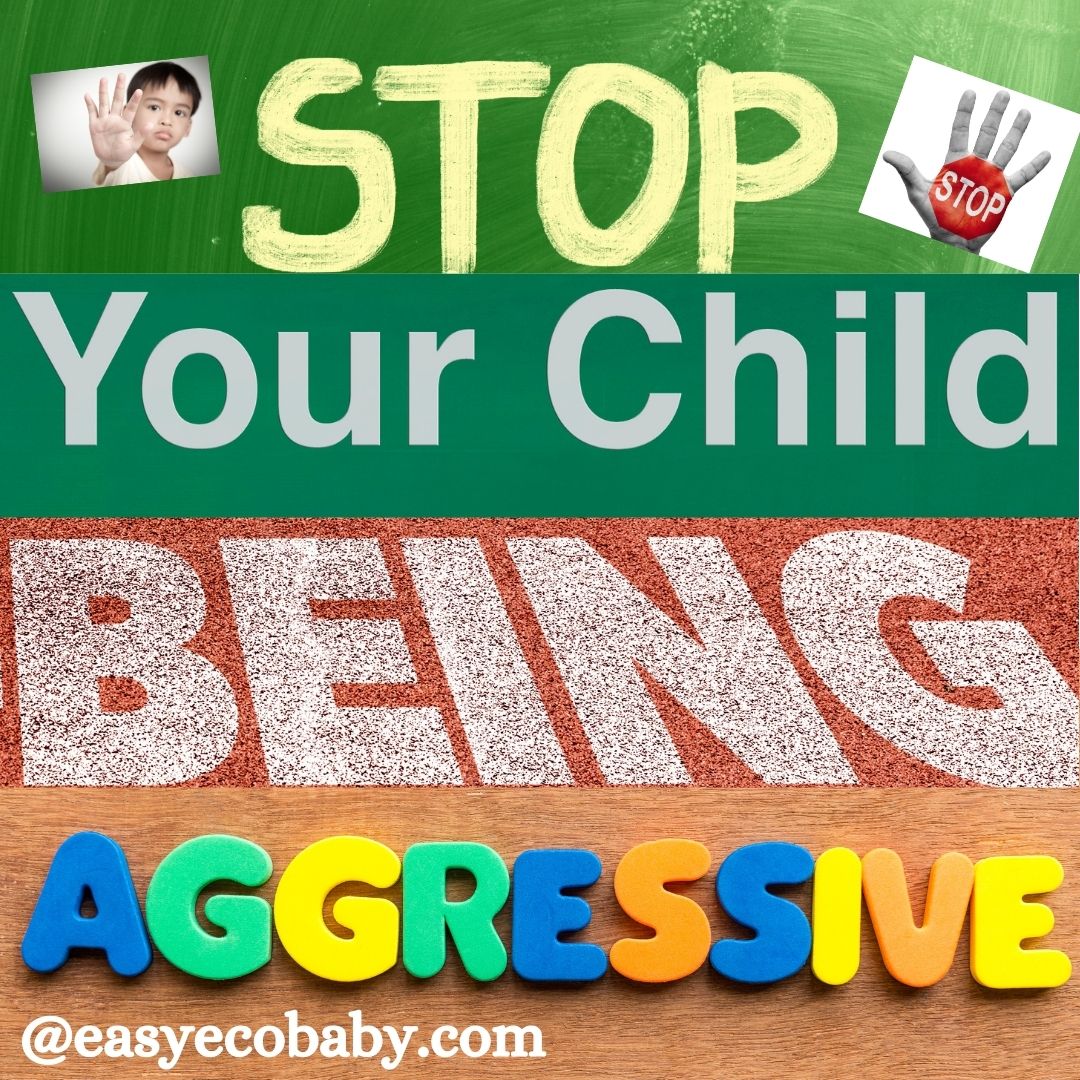Sometimes children have an aggressive phase. They hit, bite, push, kick, scratch and shove, which leads to hurting other people. You don’t want your child to keep up this behavior, so you want to know how to stop your child being aggressive.
Everything is a phase
Let’s just say at this point that a lot of children go through this phase, sometimes more than once.
Your child is growing and learning about the world and they have a lot of restrictions/boundaries for their safety. It is normal to push against boundaries, they are testing their independence.
Parenting is never easy and parents are all human. Each time your child expresses himself/herself in a rebellious way, you are probably feeling the stress, that makes you want to react without stopping to think first. Talking about this matter should be a great help for parents facing openly insolent children or when coping with aggressive kids. When you discuss it you can agree on a course of action to follow, so it doesn’t become a case of your child manipulating one or both of you to get their own way.
Really? A small child manipulating you?
Oh yes, they can do this. Not all will but if you don’t set a course of action that you both follow, it can become a problem. How do I know? It happened to me.
My 2 year old starting misbehaving and we would end up arguing.
Well, I was talking to my midwife, I was expecting my second child then, and she said, she is manipulating you both. I have to admit I found it hard to believe. My golden haired, angelic faced child manipulating? No way, she was far too young!
So we talked about this and decided a plan of action and it stopped. She did however pull the other tactic quite common. I would say no to something and she would ask her dad instead and of course he would say yes, not knowing I had just said no.
So we had to have the talk again and agree to each check with the other before agreeing to something.
Do they all do that?
No of course not. Plus it only gets out of hand if you don’t realise quickly whats going on and nip it in the bud. It’s very easy to start blaming each other and not considering the real culprit.
It’s a normal part of growing up, they constantly test you to see how far they can push you. If upsetting one parent gets them what they want, they will do it all the more.
If you usually give in and yes to most things, your child will not like it when you do say no and will try everything to change your mind. This will include pleading, crying, tantrums and trying to manipulate you.
You are probably looking at your angel and saying NO! my child wouldn’t do that. But at some point they nearly all do it. Those with older siblings will watch and learn and be more subtle about it.
Aggressive Behaviour
This can come from being too easy going, not always though and then realising it is getting out of hand so you start saying NO and meaning it. This does not go down well. It can result in them screaming, hitting out at you, kicking, scratching and even biting.
It is a tough time for small children once past the little baby stage. They find a bit of independence learning to walk and climb and there is mummy and daddy saying no loudly. It’s often loud because you panic seeing you child in possible danger, quite normal. So not only do you say no and stop your child repeating this new found skill but you say it loudly in an unfamiliar tone that can scare them.
When your child reacts angrily when they are small it can seem amusing and cute. However as they get bigger it is no longer cute and is harder to stop. Mainly because they don’t understand why you don’t think its funny anymore and you are telling them off.
It’s all about consistency. Talk about the line you will both take. Decide you must be firm about any behaviour you don’t like from the start and stick with it.
How to stop your child being aggressive
This is not an easy thing to deal with and it is simply easier said than done in several cases. However, the little methods disclosed here should help you stay calm and cool whenever your child pushes those buttons that invariably set you off.
Count to Ten
This might sound funny yet it really works wonders. Allow your child to see this as you do it. As you do the counting, take deep slow breaths. In addition, imagine yourself as calm, while going through the scenario with good results. If you are very angry, walk away until you are calmer.
Show Some Authority
Determine that nobody has the true authority over you except when you allow them to. Furthermore, it is your choice whether you get upset or angry. YOU are the adult, you are in control. Yes, a small child can try the patience of a saint but you can rise above it and retain control. Be quietly firm and insistent that they will do as they are told.
Always Monitor Your Progress
Remind yourself of all the times when you have successfully dealt with the aggressive behavior of children. At times it can catch you at the wrong moment and it can therefore be harder to deal with. In this case, a time out is always useful. It gives you a step back and the child a quiet time to consider their behavior.
Tell Yourself that It Won’t Last Long
Always remind yourself that it won’t last more than a couple of moments. Remind yourself that this is just a phase, that everything passes and nothing lasts forever. That your child will eventually grow up, whether defiant or aggressive, much quicker than you actually want them to.
Always try to be Positive
Your child might be going through a difficult phase but it will pass. Other parents go through similar things whether they admit it or not. Yes there will always be that parent who swears blind their child never does anything wrong, is always helpful kind and caring too.
You can remind yourself when you hear that, that the chances of it being true are fairly remote. To be honest, if a child was always quiet and perfectly behaved, I would be very concerned.
Don’t Respond To Aggression With Aggression
An obvious one but also one that can be hard to remember when you are in the midst of it all.
Keep in mind that responding to aggressive behavior with aggressive behavior is never a good idea. All it does is tell the child that the behavior is okay. Your child desperately wants to become just like you and he or she will imitate any attitude you show.
Some think it is okay to bite the child back to show them it hurts but all you are doing is telling them that behaving in that way is okay. Or pull their hair if they do it to you, again all you are doing is reinforcing the aggressive behavior.
Be An Example
If you want to teach your child good behavior, you will need to practice the things you preach. Remain calm, don’t let any anger you feel show. Don’t shout and use harsh words. Always teach and show your capability to manage your emotions. Each time you feel like swearing or shouting, stop and consider the effect on your child..
Toddlers emotions are hard to cope with
When they first start feeling all the unfamiliar emotions it can be hard to deal with for a small child. This alone can make them react aggressively.
There are cards you can get to help them understand their emotions. They have pictures of faces with different emotions, you can go through them and encourage your child to make the same faces and explain each one. If they seem very emotional ask them to show you how they feel with the cards so you can talk about what is making them feel that way.
Encourage him/her to inform you whenever he or she feels upset or angry whenever possible. Let them know it is okay and that everyone feels this way at times.
Recognise Their Efforts
Always praise the efforts made when they overcome or deal well with such emotions or any behavior. If you give them a reason to behave better, it will encourage them onwards.
But always remember that they are children and that every child demands attention. To them, even bad attention is better than none. They will push at their boundaries, they will get into mischief and at times they will hit out. The way you deal with each and every incident will either reinforce bad behavior or help them get past it quicker.
Make it easier on You
It is not always easy being a parent. Unfortunately, they don’t come with a user manual and every single child is different. There is no one size fits all when it comes to parenting and the methods used.
We fumble our way through the experience and learn as we go along, that goes for every parent. I don’t care if someone has a degree in parenting it still won’t help when it comes to the everyday things.
All you can do is your best. Ask other parents for advice, ask your family for advice but only take and use that which feels right for you and your child.
Medical reasons
Sometimes you have tried everything and still don’t know how to stop your child being aggressive.
Sometimes your child can be aggressive because of allergic reactions to food colorings, E numbers, preservatives and other food ingredients. It is not your fault, it happens. I have seen it happen, from a simple thing like an orange lolly, to an excess of sugar in a child that wasn’t used to it causing adverse behavior.
So even sugary things they aren’t used to can alter behavior.
Monitor patterns of unusual behavior that is difficult to deal with and write a food diary to see if you can find the cause. If not seek medical help if needed.
Did this help?
Did this help in any way? Do you have anything to add to this, any helpful comments that could help others, ways that you dealt with difficult situations that helped?
It is very easy to miss the obvious when dealing with babies and small children, especially if you are very tired. Which is of course a part of the whole parenting experience.
There is also the love and joy they bring, the milestones that amaze, so many firsts to enjoy and the laughter they bring to your life too.
More Help!
The NHS website also has helpful advice on this subject, GO HERE!
There are also further links on the same page for more help.
If you enjoyed this and found it helpful, please share. Comments and questions welcome.
